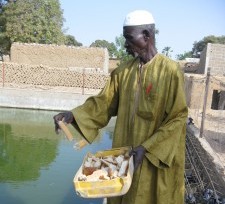
Legume Innovation Lab Director Irvin Widders Honored with 2015 Ralph Smuckler Award
The Legume Innovation Lab Director Irvin Widders has been named the recipient of the 2015 Ralph Smuckler Award for Advancing International Studies and Programs at Michigan State University (MSU). Widders’s commitment to helping smallholder farmers (many of whom are women) […]

Horticulture Innovation Lab Showcases Recent Research on Horticulture, Nutrition, and Postharvest at Two Washington, D.C. Events
The Feed the Future Innovation Lab for Collaborative Research on Horticulture (Horticulture Innovation Lab) hosted two separate events this July in Washington, D.C. showcasing their research on varied horticulture, nutrition, and postharvest topics. The events were both retrospective and forward […]

AquaFish Strengthens Fish Value Chains for Men and Women Fish Farmers
Declines in the wild fish catches in Kenya’s Lake Victoria have spurred the expansion of fish farming in the region. The Feed the Future Innovation Lab for Collaborative Research on Aquaculture and Fisheries (AquaFish) expanded work conducted under the former […]

Reducing the Vulnerability of Kenya’s Pastoralists to Drought with Livestock Insurance
In the arid and semi-arid lands of northern Kenya, pastoralists’ livelihoods depend on the health of their herds. In anticipation of drought, households often avoid potentially high-return activities for safer strategies, keeping them poorer than they need to be. When […]

CRSP Research Increases Agricultural Productivity
Achieving increases in productivity, defined as deriving greater output per unit of input, is a central feature of USAID-funded agricultural programs and particularly the work of the Collaborative Research Support Programs (CRSPs). Productivity gains can come from improvement in breeding, […]

Building the Technical and
Institutional Capacity to Feed the World
To solve the puzzle of sustainably producing more food and feed for tomorrow under conditions of increasing resource scarcity it is critical to build the knowledge and skills of actors in the global food system today. This task has been undertaken by the […]

Strengthening Value Chains to Benefit Small Producers
The CRSPs are working to build efficient and effective value chains across the globe. They have recognized that scientific advances to increase yields without regard to the market can have negative consequences for small producers if it creates a glut […]

New Network of Plant Pathologists Prevents Disease Spread
Phytophthora, Greek for plant‐destroyer, is a ubiquitous plant pathogen that robs the world’s farmers of billions of dollars each year. This soil‐inhabiting pathogen, more closely related to brown algae than true fungi, travels the dank, dirty corners of Earth’s underbelly […]

Reducing the Gender Gaps in Agriculture: The Experiences of IPM, Peanut, and SANREM CRSPs
According to the 2010-2011 State of Food and Agriculture, closing the gender gaps in agriculture has the potential to raise total agricultural output in development countries by between 2.5 and 4 percent and to reduce the number of hungry people […]

Enhancing Pastoralists’ Knowledge of Livestock Health Issues in Tanzania
Livestock-Climate Change (LCC) CRSP HALI-2 researchers knew that Tanzanian pastoralists were hungry for livestock health education. But what is the best way to deliver that education and what topics should be covered? This was the focus of the researchers’ most […]
